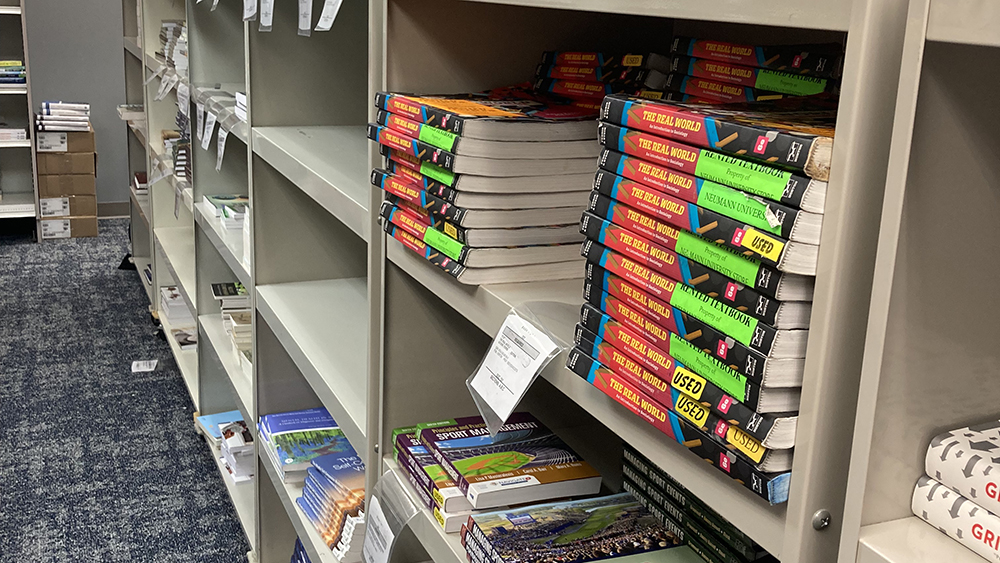Tattoos are not just ink on skin, rather, they often tell stories, represent beliefs, and hold deep...
Textbooks Take Their Toll, It is Time for Them to Go

I receive the textbook list and immediately feel anxious. The thought of spending another three hundred dollars or more on books after already paying an exorbitant amount on tuition makes me want to cry. The semester has not even started, and already I have blown my bank account.
After talking with students from Neumann University, Immaculata University and Mount Saint Mary’s University, I realize that the price of textbooks is a growing problem and that my feelings of anxiety are shared by college students everywhere.
Everyone I interviewed agreed that textbook prices are too high and that the rising prices cause them aggravation. Each year, prices of textbooks continue to rise, and students continue to suffer.
According to Melanie Hanson, senior editor for the Education Data Initiative, “25% of students reported they worked extra hours to pay for their books and materials, 11% skipped meals to afford books and course materials, and 63% of students say they have skipped buying a textbook altogether because they could not afford the price.”
Textbooks are taking their toll, and it is time for them to go away for good. With new innovations and alternatives to print sources, textbooks are no longer necessary. Schools that have invested in these alternatives have saved students money, helped their performance, and provided students with an equal opportunity to succeed.
Here at Neumann, we have moved toward inclusive access and eBooks. “These alternatives are more affordable to students” according to Natalie VanWyk, head of the Neumann bookstore.
The modern-day classroom includes students accessing their books online. VanWyk stated that grade school and high school students utilize eBooks in their everyday learning. When these students enter college, Neumann wants their transition to be comfortable. Providing a service that students recognize makes learning engaging and less stressful.
Plus, the bookstore makes its revenue on merchandise rather than textbooks, according to VanWyk. This statement supports the idea that paying for print sources has become outdated and that purchasing physical textbooks could become a thing of the past.
In fact, college without textbook cost is not unrealistic. There are resources available where students can access quality textbooks for free.
An alternative Neumann uses is the library course reserves. Tiffany McGregor, director of the Neumann Library, explained how faculty could bring a copy of a textbook and place it on reserve for students to use exclusively in the library. Students can reserve the textbook for four hours at a time for no cost. This allows all students to have access to the book throughout the semester.
Library reserve is a fair and equitable process that gives students the opportunity to succeed without having to break the bank. If a specific reading is assigned, and if the book is on reserve, students could visit the library to gather the information rather than pay for the print source.
Library reserve can become tricky if two students want the book at the same time. Luckily, we live in a digital age where one could always take pictures of the pages they need and then read them on their phone/laptop.
Students could also coordinate to ensure that everyone can complete the reading before the deadline by creating a sign-up genius and picking slots when each person could access the book.
Finally other schools have helped students with costs by implementing a program called open educational resources, also known as OER.
According to Hanson, “a growing number of universities are letting their faculty adopt these course materials to help reduce student costs.” Rather than having students pay excessive amounts on print sources, they can access free openly licensed textbooks through OER.
For many universities OER has become the simple solution to the pressures that come from buying textbooks. For example, “Since 2019, Oregon State faculty and the Open Educational Resources Unit have helped OSU students save more than $17 million in course material costs” according to Tyler Hanson, a writer for Oregon State University Ecampus.
OER also proves to be a useful tool for professors. According to The SAGE Encyclopedia of Higher Education, “OER allows instructors to design more course-specific readings and activities - a rarity when utilizing textbooks which are written to be generalizable for course work in several institutions worldwide.”
Those who disagree with this opinion may argue that books are essential to learning and that if one is willing to pay a lot of money on tuition, they should be able to pay for the cost of textbooks.
My response is that where you attend college is a choice. You know when you decide where you are going to attend how much you will invest. You can also choose to save money by commuting or opting out of a meal plan.
Books, on the other hand, are not a choice. They are a requirement. To graduate, students are required to take certain courses.
As a Communications major, I will never look at a science or math book again, yet to be successful in the required class, I had to purchase the expensive book. With these new alternatives in place, it is unfair to expect students to continue to pay so much for textbooks.
It is time to stop the cycle of stress that is associated with textbooks. They have caused too much damage, and it is time for them to go.
These new alternatives make purchasing textbooks obsolete and indicate that students can be just as excited and engaged to learn when they do not have to struggle with the thought of being broke.





